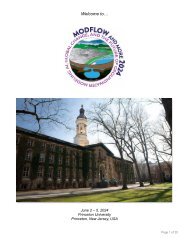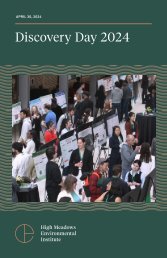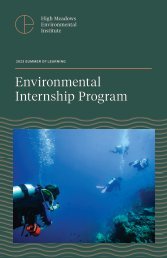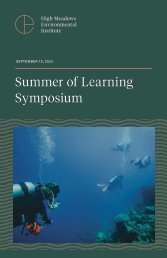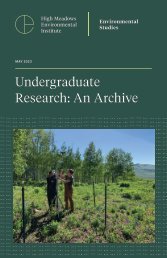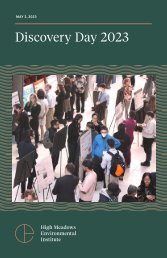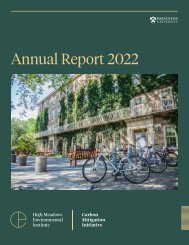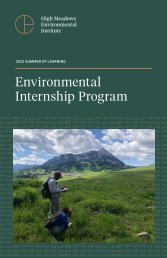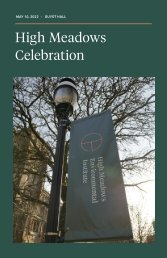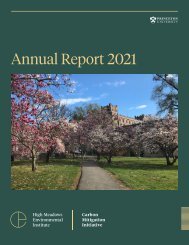Undergraduate Research: An Archive - 2022 Program
You also want an ePaper? Increase the reach of your titles
YUMPU automatically turns print PDFs into web optimized ePapers that Google loves.
Emily Cruz ’22<br />
CIVIL AND ENVIRONMENTAL ENGINEERING<br />
Certificate in Environmental Studies<br />
THESIS TITLE<br />
Modeling the Carbon<br />
Emissions of Financing<br />
Policies of Major<br />
Financial Institutions<br />
ADVISERS<br />
Chris Greig, Theodora<br />
D. ’78 & William H.<br />
Walton III ’74 Senior<br />
<strong>Research</strong> Scientist in<br />
the <strong>An</strong>dlinger Center for<br />
Energy and the<br />
Environment; Ian<br />
Bourg, Assistant<br />
Professor of Civil and<br />
Environmental<br />
Engineering and the<br />
High Meadows<br />
Environmental Institute<br />
My research evaluated how the policies of<br />
financial institutions regarding fossil fuel<br />
industries and sustainability ventures may<br />
influence these institutions' future carbon<br />
emissions. Financial institutions are key to<br />
bringing global carbon emissions to net-zero<br />
by 2050 because their financing will directly<br />
influence the future energy mix. Many financial<br />
institutions have touted net-zero goals and<br />
instituted policies that include divesting from<br />
fossil fuels, committing to invest in renewableenergy<br />
products, and allowing consumers to<br />
invest in more sustainable or renewable ventures.<br />
I compiled data on bank policies from the<br />
Rainforest Action Network’s “Banking on Climate<br />
Chaos” report to model future financing for fossil<br />
fuel industries, as well as collect and visualize<br />
cumulative sustainability commitments. My<br />
models projected that the banks I analyzed<br />
will likely increase fossil fuel investments,<br />
particularly in fossil fuel companies expanding<br />
their production or utilization of fossil fuels.<br />
There was, however, a slight projected decrease<br />
in some banks’ carbon emissions intensity,<br />
likely due to the change in the type of fossil fuel<br />
invested in over time. This research highlighted<br />
the importance of having strict guidance for<br />
banks' fossil fuel financing that ensures the<br />
implementation of policies that will reach 2050<br />
net-zero goals rather than policies that amount to<br />
“greenwashing.”<br />
ENVIRONMENTAL<br />
POLICY AND SOCIETY<br />
18




